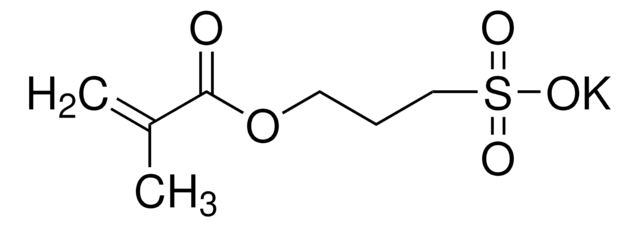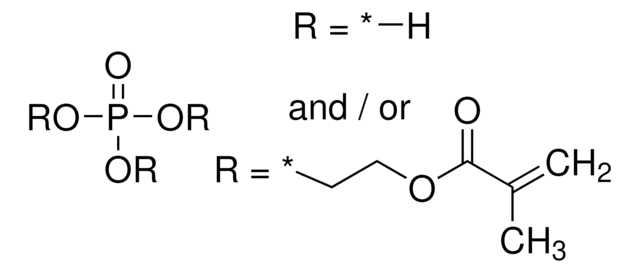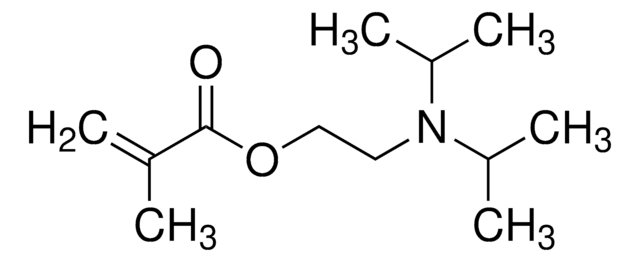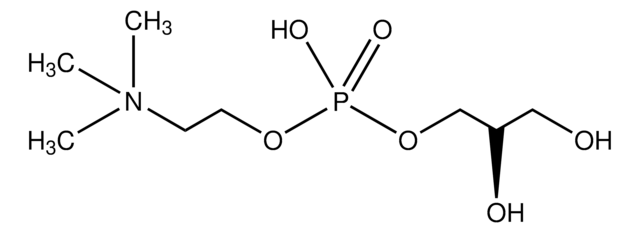추천 제품
일반 설명
2-Methacryloyloxyethyl phosphorylcholine (MPC) is a zwitterionic phosphorylcholine group-containing methacrylate monomer and is the most suitable monomer to mimic the phospholipid polar groups contained with cell membranes. It is also used in the preparations of a wide range of polymeric biomaterials because of its excellent resistance to nonspecific protein adsorption, biocompatibility, and low toxicity. It is also used to develop diverse molecular structures with adjustable properties using a range of polymerization methods, including living radical polymerization. Due to the reactivity of methacrylate, MPC-based materials have a wide range of applications in biomedical fields. Furthermore, MPC is also used as a monomer in the production of various polymeric materials for several applications such as medical devices, lithium-based batteries, contact lenses, drug delivery, wound dressings, and tissue engineering scaffolds.
애플리케이션
2-Methacryloyloxyethyl phosphorylcholine (MPC) can be used in the following applications:
- Use as a monomer to produce fully zwitterionic polymer networks in a solvate ionic liquid for use as a gel electrolyte in lithium-based batteries.
- Synthesis of polymer coatings for medical devices to prevent blood clotting and bacterial adhesion.
- Preparation of hydrogels for use as contact lens materials and wound dressing.
- Production of polymeric micelles and nanoparticles for drug delivery.
- Use as a monomer to prepare polymer-modified antifouling silicone hydrogel contact lenses. The addition of MPC forms a cell membrane-like structure on the contact lens and helps to prevent cell and bacterial adhesion on the surface.
특징 및 장점
- It has bioinert properties due to the presence of a zwitter ionic phosphorylcholine (PC) group in the side chain.
- It can build various molecular architectures with tunable properties.
- It has excellent resistance to cell adhesion, blood coagulation, and non-specific protein adsorption.
관련 제품
제품 번호
설명
가격
신호어
Warning
유해 및 위험 성명서
Hazard Classifications
Skin Sens. 1
Storage Class Code
11 - Combustible Solids
WGK
WGK 1
이미 열람한 고객
Boxuan Ma et al.
Acta biomaterialia, 70, 186-196 (2018-02-17)
Intelligent drug delivery systems with prolonged circulation time, reduced drug leakage in blood, target site-triggered drug release and endosomal escape are attractive and ideal for malignant tumor therapy. Herein, doxorubicin (DOX)-conjugated smart polymeric micelles based on 4-carboxy benzaldehyde-grafted poly (L-lysine)-block-poly
N Nakabayashi et al.
Biomaterials, 24(13), 2431-2435 (2003-04-18)
This review addresses the non-thrombogenic characteristics of copolymers based on 2-methacryloyloxyethyl phosphorylcholine (MPC), originally developed by Nakabayashi and colleagues. The hypothesis underlying these developments was that such materials would adsorb phospholipids from blood, yielding surfaces with good natural blood compatibility.
Yumiko Obayashi et al.
Frontiers in microbiology, 8, 1952-1952 (2017-10-27)
Microbial extracellular hydrolytic enzymes that degrade organic matter in aquatic ecosystems play key roles in the biogeochemical carbon cycle. To provide linkages between hydrolytic enzyme activities and genomic or metabolomic studies in aquatic environments, reliable measurements are required for many
N Nakabayashi et al.
Bio-medical materials and engineering, 14(4), 345-354 (2004-10-09)
Copolymers of 2-methacryloyloxyethyl phosphorylcholine (MPC) showed good hemocompatibility as hypothesized. The hypothesis was surfaces having phosphorylcholine groups by polymerization of MPC could accumulate phospholipids from blood stream and show good blood compatibility. We designed and prepared a methacylate having a
Piers E Milner et al.
Acta biomaterialia, 65, 102-111 (2017-11-08)
Partial joint repair is a surgical procedure where an artificial material is used to replace localised chondral damage. These artificial bearing surfaces must articulate against cartilage, but current materials do not replicate both the biphasic and boundary lubrication mechanisms of
자사의 과학자팀은 생명 과학, 재료 과학, 화학 합성, 크로마토그래피, 분석 및 기타 많은 영역을 포함한 모든 과학 분야에 경험이 있습니다..
고객지원팀으로 연락바랍니다.![[2-(Methacryloyloxy)ethyl]dimethyl-(3-sulfopropyl)ammonium hydroxide 95%](/deepweb/assets/sigmaaldrich/product/structures/217/219/73c91e1c-0ee4-4b3d-bead-a6dc3d09d1da/640/73c91e1c-0ee4-4b3d-bead-a6dc3d09d1da.png)
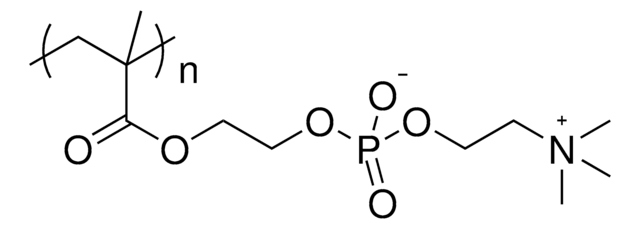
![[2-(Methacryloyloxy)ethyl]trimethylammonium chloride solution 75 wt. % in H2O](/deepweb/assets/sigmaaldrich/product/structures/316/612/66b0f4cf-d060-427d-b4f5-e8fab3e5cffe/640/66b0f4cf-d060-427d-b4f5-e8fab3e5cffe.png)
![Bis[2-(methacryloyloxy)ethyl] phosphate](/deepweb/assets/sigmaaldrich/product/structures/128/336/4e7a3e38-338c-423e-95b8-70d9d1f8e121/640/4e7a3e38-338c-423e-95b8-70d9d1f8e121.png)


![[2-(Acryloyloxy)ethyl]trimethylammonium chloride solution 80 wt. % in H2O, contains 600 ppm monomethyl ether hydroquinone as inhibitor](/deepweb/assets/sigmaaldrich/product/structures/393/326/f7e19585-5431-4220-81b5-f458de6d63d0/640/f7e19585-5431-4220-81b5-f458de6d63d0.png)
